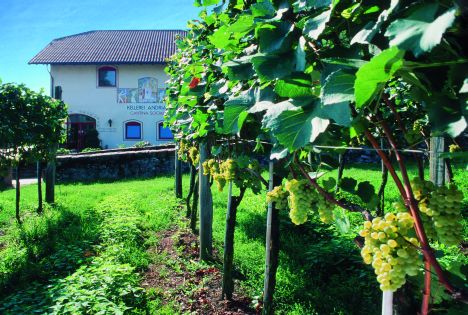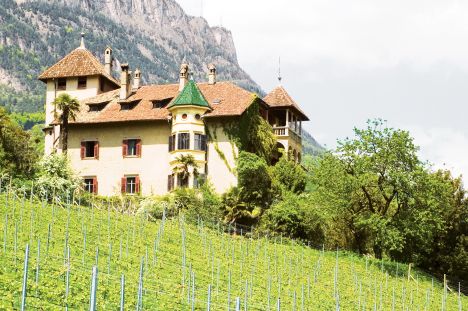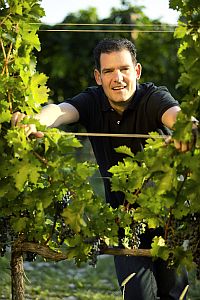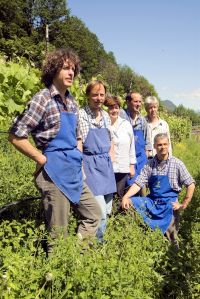The Andrian WineryAt the beginning of the 1990s, the oldest winery cooperative in South Tyrol decided to separately vinify the grapes of its organically farmed members,
Baron Paul Kripp and Paul Spornberger, and offer them as an organic line. At present, this range consists of two white wines -
Chardonnay and
Pinot Grigio - and two reds -
Vernatsch and Lagrein. Currently, about 25,000 bottles are produced. The wines are certified according to
Bioland guidelines and are mainly sold in organic and specialist wine shops.
Most of it in South Tyrol and the rest in Germany. "The Italian market is practically non-existent for organic wines," says farm manager Paul Tauferer. The four wines of the winery are pleasant, very typical wines from South Tyrol that definitely deserve more attention than they are currently getting.

|
|
The Andrian Winery
|
The Solos project of the Kaltern Winery
The comrades of the Kaltern Winery go one step further than their Andrian colleagues with the Solos project. This project developed from the intention to create a top quality line. For this purpose, the 1.7 hectares of vineyards of
Castel Giovanelli above Kaltern were leased in 2002. Over time, this pure quality wine project has developed into a biodynamic one. Cellar master Helmuth Zozin already thought back then that really good grape quality can only come from healthy,
vital vines and he was positively disposed towards all methods that promote this from the very beginning. The Solos project now covers 12 hectares in some of the best locations around Lake Kaltern. These are cultivated by six members of the cooperative according to biodynamic guidelines. I was
able to visit some of the converted vineyards with one of them, Andreas Dichristin, and talk to him at length about the methods of biodynamics.

|
|
This is where the Solos project was born: Castel Giovanelli
|
The biggest problem, especially in a
climate that is not exceptionally dry like in South Tyrol, is of course fungal infestation. In both conventional and organic cultivation, this is countered with copper-based products. As copper is a heavy metal that accumulates in the soil, the amount is limited by organic regulations to three kilos per hectare and year. This presents many organic farms with great difficulties in some years. The biodynamic approach seeks solutions to this problem, which on the one hand consist of alternative preparations and on the other hand, or at the same time, attempts are made to improve the overall vitality of the vines and thus to keep as far away from copper as possible. By using clay, which is sprayed on the plants and has a moisture-removing effect, Andreas Dichristin has succeeded in reducing the use of copper in his vineyards to 1 to 1.2 kilos in recent years. This value caused some other organic
winegrowers I spoke to to shake their heads in amazement and disbelief.
Most of them thought that one simply could not manage with such a small amount in South Tyrol. But, Dichristin says: "This is one of the
most important differences between the biodynamic and the organic approach. Unfortunately, the latter often only consists of replacing chemically synthetic plant protection products with natural ones. This is certainly good for the environment. However, it does not usually have an effect that promotes soil balance and thus the vitality of the plant. This remains dependent on measures against disease infestation and if, due to the organic standards, only copper-based agents are permitted, in difficult years there can certainly be problems in keeping to the permitted quantities. However, a
vital plant is much more resistant to fungal
attack and therefore needs less protection."

|
|
The initiator of the Solos project: Helmuth Zozin
|
Another important point for Andreas Dichristin is the deep rooting of the vine in the soil. This has two effects: The plant gets its nutrients and what ultimately ends up as
flavour in the grapes from deeper layers, "where you can really talk about terroir", and "it becomes more resistant to both prolonged dry periods and extreme rainfall". The irrigation systems are still present in the vineyards, but, Dichristin says, "we haven't used them for years." Deep rooting thus ensures more constant growth independent of the immediate weather situation, which in turn has a positive effect on the vitality of the vine. The aim is to "bring the plant into balance so that the yield remains relatively constant over the years and we can do without thinning out the grapes. This is because every cutting away of grapes, as well as foliage, is an intervention in the plant that it has to compensate for somehow, which costs it energy, which in turn negatively affects the vitality and thus the health and quality of the grapes."

|
|
The six members of the Solos Project
|
As far as the
terroir character of the wines is concerned, the Solos project presents a picture that is contradictory at
first glance: the
classic red wine of the growing region,
Kalterersee, is
seen by
most critics as a rather atypical representative of its kind. It is quite dark in colour, a bit more pithy and austere in taste than one is used to from
most Kalterersee wines. "But that's how
Vernatsch from these vineyards directly above Lake Kaltern, when it comes from deep-rooted vines and nothing else is done with it, is spontaneously fermented in the cellar with its own yeast strains. I have to agree with Andreas Dichristin. The Solos is not a soft,
mild Kalterersee, but rather
feinherb, elegant and mineral. When I tasted it, I immediately thought of the
Vernatsch Gschleier from the Girlan winery. The Solos does not have the same depth and ageing
potential (but not the same price either!), but there is certainly a certain similarity. And the Gschleier is also made from very old, deep-rooted
Vernatsch vines and is often described by critics as atypical. But no critic would come to deny the Gschleier its class despite its non-typicality. Perhaps in the future we will have to rethink some
Vernatsch wines in terms of their typicality.
Back to biodynamic soil management. In the meantime, fertiliser is hardly used at all in the vineyards of the Solos people. "I do make compost, but it is mixed with biodynamic preparations and is not actually applied as a direct material, but mainly as information for the
humus formation of the soil." On an area of about 7000 square metres, just two kilograms of compost are applied. "The compost interspersed with the preparations "represents something like the ideal image for the soil. It should get to know that and then produce it on its own.
Humus has the property of binding the absorbed nutrients and water and then giving it to the plant when it needs it. This is in contrast to water-soluble salt fertiliser, which the vine has to take up automatically with the water, whether it needs it at the time or not. Which in turn leads to unbalanced growth and poorer quality."
For some of the
winegrowers working in the Solos project, all these things naturally take some getting used to and initially there was a
lot of scepticism. The
winegrower in
charge of the vineyards at Castell Giovanelli, Paul Dissertori, was a completely conventional
winegrower who said: "I'll just do what you tell me, and if the grapes go mouldy in two years, we'll just spray something on them again". In the meantime, he has converted his own vineyards to biodynamics. Here, practical success made many theoretical discussions, often turbulent and very emotional, superfluous.
In addition to
Kalterersee, the Solos project currently has a white wine
cuvée consisting of
Pinot Blanc,
Pinot Grigio,
Chardonnay and Sauvignon. A fruity,
mineral wine with a pleasantly distinctive acid structure.
Lagrein,
Cabernet and
Merlot wines are still maturing in the cellar of the
Kalterer Genossen and will soon be added to the Solos range.
Part 3 "Even the stars are turning green



